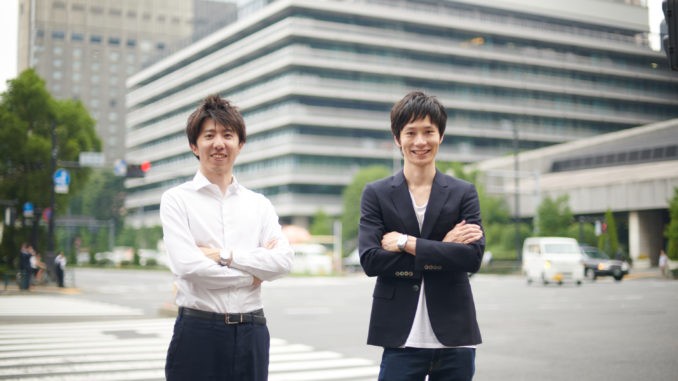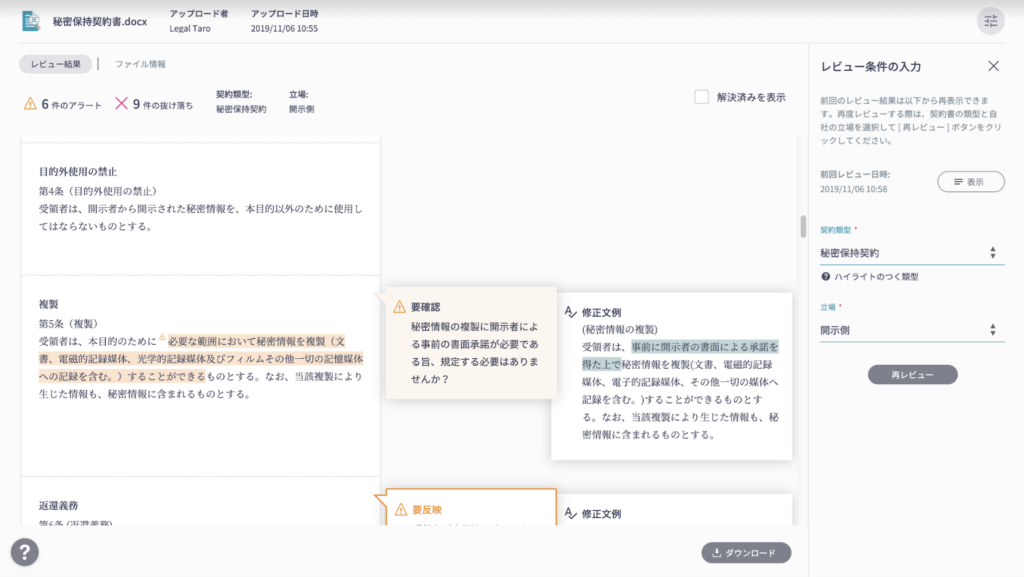
Japan is a huge economy, famous for its technology and manufacturing prowess. It’s also a market where the legal tech sector has plenty of room to grow still. One of the homegrown companies leading the way is Legalforce, a legal AI doc review/analysis system. Artificial Lawyer caught up with the team and asked them a few questions about their product and the evolving Japanese legal tech market.
– Please can you tell the readers how the company got started? What was the inspiration?
Legalforce was founded by two lawyers (Nozomu Tsunoda and Masataka Ogasawara – pictured above) who felt that traditional legal models were ripe for disruption. After nearly 12 years combined at one of Japan’s largest law firms, the founders developed a strong belief that the inefficient “hourly billing model” would be fundamentally challenged by the advent of new technologies.
To remain competitive, law firms would have to eliminate repetitive tasks, such as contract review, through the use of machine learning, thus allowing fewer, highly-skilled lawyers to more quickly and cost effectively advise their clients. Conversely, firms that were resistant to change would struggle as clients would seek to retain higher-quality advice at a lower cost.

Eager to be the first to what they predicted would be a rapidly growing market in Japan, the founders created LegalForce in 2017. By leveraging technology in ways they had predicted, they have found success marketing their product to both businesses and law firms. This success has allowed them to expand the company’s workforce from the founding members to nearly 100 full and part-time employees. Moreover, as the first to market in Japan, LegalForce has successfully established itself as a pre-eminent legal tech venture with customers, including Japan’s largest corporations.
– Please can you explain how the system works?
LegalForce provides contract review software to legal professionals employed at either corporations or law firms. The technology enables legal professionals to both instantly identify legal issues within contracts and to insert appropriate, revised language at the click of a button. In the event, for example, that a sales contract terminates too quickly, or a party has forgotten the appropriate standards for delivery, LegalForce will both flag the issues and provide suggested changes. Suggested changes are automatically drafted in accordance with an automatic analysis of the contract and an extensive contract database. If customers prefer, they can manually select revisions from their own in-house contract database.
The LegalForce technology itself is driven by natural language processing that leverages a variety of machine learning algorithms. The technology has been developed in partnership with researchers at Kyoto University.
Currently, the technology is able to review 16 distinct types of contracts, ranging from NDAs to sales agreements. In addition, English contract capabilities are currently under development and an initial beta of our English-language product was released in November, 2019.

– What kinds of law firms/companies are you working with?
Currently, our company provides services to a variety of entities, ranging from large multi-nationals to law firms. Wherever contract review is needed, we are able to provide cost savings and synergies through the adoption of our software. Some of our initial partners included household names such as Fujitsu, Sojitz, and Suntory. As of April 2019, we have approximately 200 fully-registered customers using our products.
– Is there pressure now in Japan to reduce the cost of legal services in areas that are ‘process level’, e.g. due diligence for M&A?
We have determined that in-house legal teams in Japan devote nearly 60% of their time to contract review. Moreover, the overall workload of in-house counsel has steadily increased as companies are expanding operations into foreign markets were detailed contracts are essential. Further exasperating stress on in-house counsel is the fact legal-talent is hard to find in Japan. As a result, we have found companies to be highly receptive to technologies that are able to both accelerate contract review, and contract drafting and revision.
– How do you see the legal tech scene now in Japan and how do you see it changing in terms of demand from lawyers for change?
When LegalForce started, we only had a few initial partners and interest from law firms was relatively limited. In the intervening years since our creation, a number of new players have entered our field and our own customer-base has expanded rapidly. This expansion is driven by enterprises that now understand that legal tech can save money and result in high-quality work product.
In particular, more and more enterprises now seem comfortable allowing their own in-house teams to use legal tech to quickly review and draft contracts. Moving forward, we expect enterprise adoption and usage rates of legal tech to continue to expand.
Thank you! And congratulations on your pioneering work in Japan. Artificial Lawyer looks forward to seeing the Japanese legal tech market go from strength to strength.
Come Along to Two Great Artificial Lawyer Conferences:
Legal Innovators California – June 18 – San Francisco – an all-day conference focused on the intersection of technology and the business of law.
and,
Legal Innovators London – Now over two days – October 7th and 8th – one day on legal services providers, and one day focused on inhouse legal teams.

1 Trackback / Pingback
Comments are closed.